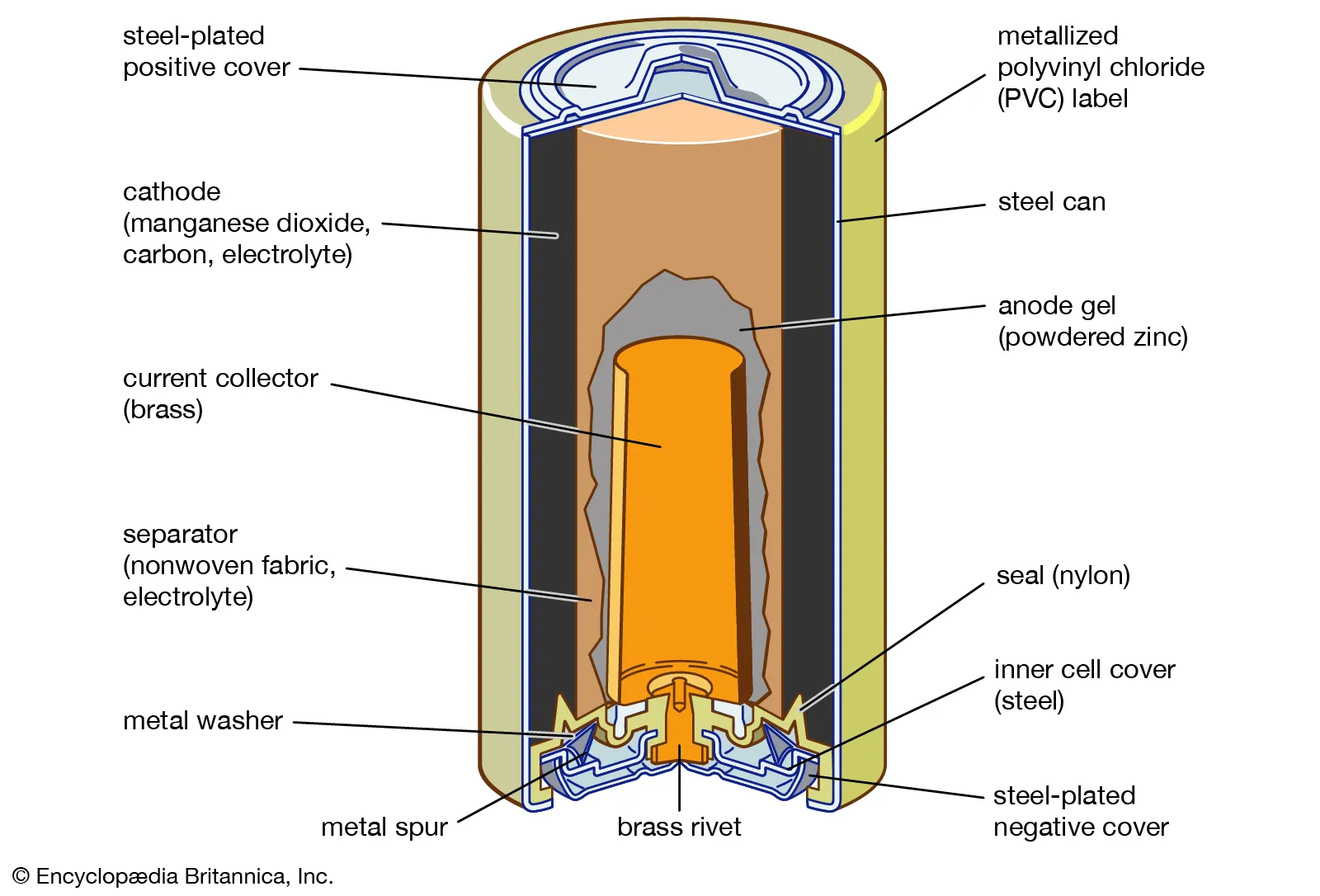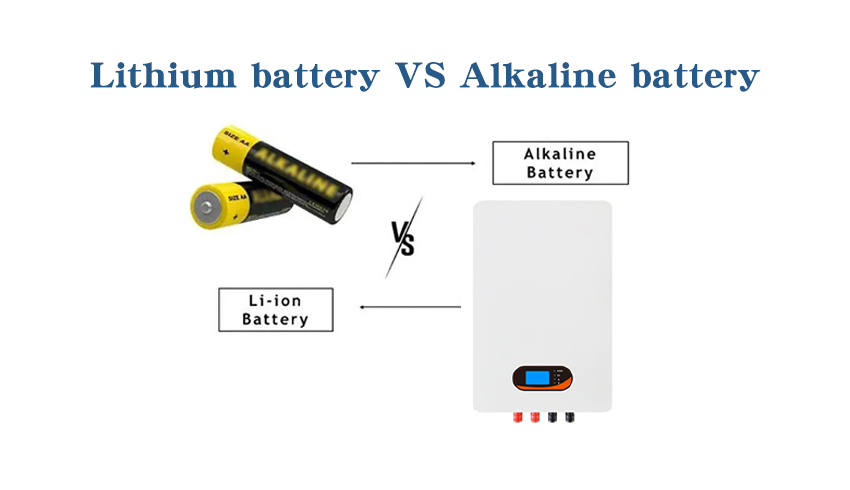A seleção de baterias de lítio e alcalina é crucial ao fornecer energia para dispositivos diários.
Este artigo se aprofundará nas diferentes características da bateria de íons de lítio versus alcalinos, Compare suas vantagens e desvantagens, para que você possa fazer uma escolha sábia com base em suas próprias necessidades.
O que é uma bateria de íons de lítio?

As baterias de íons de lítio são um tipo comum de bateria recarregável amplamente usada em vários dispositivos eletrônicos, como smartphones, notebooks, e veículos elétricos.
Seu mecanismo de operação é baseado no movimento de íons de lítio do eletrodo negativo (ânodo) para o eletrodo positivo (cátodo) da bateria durante a descarga, e vice -versa durante a cobrança.
Este tipo de bateria tem as características de ser leve e ter uma alta densidade de energia, e pode armazenar uma grande quantidade de energia em um volume menor.
Eles são favorecidos por sua longa vida útil e boa capacidade de retenção de bateria, tornando -os muito adequados para uso em dispositivos eletrônicos portáteis.
Vantagens das baterias de íons de lítio
Luz:
As baterias de íons de lítio são muito adequadas para dispositivos portáteis, como smartphones, notebooks, e veículos elétricos devido à sua natureza leve.
É também um componente importante nos sistemas de armazenamento de energia solar.
Alta densidade de energia:
As baterias de íons de lítio podem armazenar uma grande quantidade de energia em um volume menor, estendendo assim a vida útil do dispositivo.
Baixa autodescarga:
As baterias de íons de lítio têm uma baixa taxa de auto -descarga e podem manter seu poder, mesmo que não seja usado por muito tempo, garantindo que eles estejam sempre disponíveis.
Saída de tensão estável:
Durante o processo de alta, A tensão permanece estável, fornecendo energia contínua e estável ao equipamento até que a bateria seja esgotada.
Recarregável:
As baterias de íons de lítio podem ser carregadas várias vezes, tornando -os mais econômicos e ecológicos em comparação com baterias descartáveis.
Deficiências de baterias de íons de lítio:
Vida de bicicleta limitada:
A frequência de carregamento das baterias de íons de lítio é limitada, e à medida que a frequência de carregamento aumenta, Sua capacidade de manter o poder diminuirá gradualmente, em última análise, exigindo substituição.
Isso pode aumentar o custo de manutenção do equipamento durante sua vida útil.
Sensibilidade à temperatura:
As baterias de íons de lítio são sensíveis às mudanças de temperatura, e ambientes de alta temperatura podem acelerar o envelhecimento da bateria e reduzir sua vida útil.
No entanto, temperaturas extremas baixas podem afetar temporariamente o desempenho da bateria e reduzir o uso efetivo do equipamento.
Perigo oculto:
As baterias de íons de lítio podem representar riscos de segurança, como superaquecimento e expansão, e em casos extremos pode causar incêndios ou explosões.
Uso inadequado ou exposição a condições adversas podem aumentar esses riscos e representar uma ameaça à segurança do usuário e da propriedade.
Complexidade de cobrança:
O carregamento da bateria de íons de lítio requer adesão a protocolos específicos para garantir a segurança e a eficiência.
O carregamento inadequado pode levar a uma duração da bateria reduzida, desempenho reduzido, e até mesmo representar riscos de segurança.
Impacto ambiental:
As baterias de íons de lítio contêm substâncias nocivas, como lítio, cobalto, e níquel para o meio ambiente. Manuseio e reciclagem inadequados podem causar poluição ambiental e danos ecológicos.
Enquanto isso, Seu processo de fabricação também envolve mineração e processamento intensivos em recursos, que pode causar degradação ecológica.
O que é bateria alcalina?

As baterias alcalinas são baterias não recarregáveis adequadas para vários dispositivos eletrônicos de baixa potência.
Eles geram eletricidade através de uma reação química entre zinco e dióxido de manganês.
Esse tipo de bateria é comumente usado para fornecer energia para dispositivos como controles remotos, lanternas, brinquedos, e rádios portáteis.
As baterias alcalinas vêm em várias especificações, incluindo AA, Aaa, C, D, e 9V, e são favorecidos por sua longa vida útil e saída de tensão estável, tornando-os particularmente adequados para dispositivos de baixa potência que requerem fonte de alimentação contínua e estável.
Ao contrário das baterias recarregáveis, As baterias alcalinas não podem ser recarregadas após serem usadas até que a bateria esteja esgotada e deve ser tratada corretamente.
Apesar de ser um produto descartável, As baterias alcalinas ainda são amplamente populares devido ao seu baixo custo, Fácil acessibilidade, e adequação para alimentar os dispositivos de baixa potência diários.
Vantagens de baterias alcalinas:
Econômico e prático:
As baterias alcalinas estão amplamente disponíveis e econômicas, Adequado para consumidores de todos os orçamentos.
Longa vida útil:
Comparado com outras baterias, As baterias alcalinas têm uma vida útil mais longa, e mesmo se armazenado por muito tempo, A perda de poder não é significativa.
Tensão constante:
Durante toda a vida útil da bateria, As baterias alcalinas podem fornecer uma saída de tensão constante, garantir um desempenho consistente de dispositivos que dependem de poder estável.
Diversidade:
As baterias alcalinas vêm em vários tamanhos e especificações, Adequado para dispositivos eletrônicos que variam de pequenas ferramentas a aparelhos grandes.
Conveniência:
Como uma bateria descartável, As baterias alcalinas proporcionam conveniência para usuários que não querem cobrar, e pode ser rapidamente substituído por baterias novas quando a bateria está esgotada.
Aplicabilidade de baixa potência:
As baterias alcalinas são muito adequadas para dispositivos de baixa potência, como controles remotos e relógios de parede, que requerem um nível de bateria constante, mas baixo, a ser mantido por muito tempo.
As deficiências de baterias alcalinas:
Incapaz de cobrar:
Este tipo de bateria é um produto descartável que precisa ser descartado corretamente após o uso, Caso contrário, pode causar resíduos de recursos.
Curta vida útil:
O tempo de fonte de alimentação das baterias alcalinas é limitado e pode durar apenas algumas horas ou requer substituição após atingir um nível de tensão específico.
Não é adequado para dispositivos de consumo de alta potência:
Para dispositivos que requerem quantidades rápidas e grandes de poder, As baterias alcalinas podem se esgotar rapidamente e requer substituição frequente de bateria.
Diminuição da tensão:
Durante o uso, A tensão de baterias alcalinas diminuirá gradualmente, o que pode levar ao desempenho instável do dispositivo e afetar a funcionalidade.
Problemas ambientais:
Devido ao seu uso único, As baterias alcalinas contêm substâncias tóxicas, como zinco, dióxido de manganês, e hidróxido de potássio.
Manuseio inadequado pode causar poluição ambiental.
Alto custo de longo prazo:
Embora o custo inicial seja baixo, a longo prazo, A substituição frequente da bateria levará a um aumento total de custo.
Bateria de lítio vs bateria alcalina

Densidade de energia:
Da perspectiva da bateria de íon de lítio vs alcalina, As baterias de lítio têm uma densidade de energia mais alta.
Capaz de armazenar mais energia por unidade de volume ou peso, fornecendo energia mais durável para o equipamento.
Vida:
Quando se trata de baterias alcalinas vs lítio, As baterias de lítio normalmente têm uma vida útil mais longa e podem suportar mais ciclos de carga e descarga.
O desempenho estável a longo prazo é uma escolha melhor para uso a longo prazo.
Estabilidade de tensão:
As baterias de lítio fornecem uma saída de tensão mais estável durante o ciclo de descarga do que as baterias alcalinas.
Pode fornecer fonte de alimentação mais estável para dispositivos, especialmente em situações de consumo de alta energia.
Adaptabilidade da temperatura:
As baterias de lítio têm menor sensibilidade a temperaturas extremas e têm melhor desempenho em ambientes de alta e baixa temperatura, tornando -os adequados para uso em vários ambientes.
Baterias alcalinas vs lítio, As baterias alcalinas não são tão sensíveis.
Custo -efetividade:
Embora o investimento inicial em baterias de lítio possa ser significativo, Sua vida útil mais longa e desempenho superior os tornam mais econômicos a longo prazo.
Ambientalmente amigável:
As baterias de lítio são geralmente mais ecológicas, pode ser efetivamente reciclado, e contêm menos substâncias tóxicas.
Manuseio adequado pode reduzir o risco de poluição ambiental.
Compatibilidade do dispositivo:
As baterias de lítio são mais adequadas para dispositivos de consumo de alta potência, como câmeras digitais, smartphones, e laptops.
Esses dispositivos requerem poder de longa duração e tensão estável.
As baterias alcalinas são mais adequadas para dispositivos de baixa potência, como controles remotos, Relógios de parede, e brinquedos.
| Critérios | Baterias de lítio | Baterias alcalinas |
| Densidade energética | Maior densidade de energia e tempo de uso mais longo. | Menor densidade de energia, Vida mais curta. |
| Resistência à temperatura | Tem um bom desempenho em temperaturas extremas. | Sensível a temperaturas extremas. |
| Custo | Maior custo inicial, Mas mais econômico a longo prazo. | Mais barato inicialmente, mas a substituição frequente necessária. |
| Impacto ambiental | Recarregável, Materiais recicláveis. | Use único, mais desperdício. |
| Melhores casos de uso | Dispositivos de alto drenagem (Por exemplo, câmeras, notebooks). | Dispositivos com baixo teor de drenagem (Por exemplo, Remotos, relógios). |
Li on vs alcalino: Casos de aplicação práticos e sugestões de compra
Não tenho certeza de qual bateria é mais adequada para suas necessidades? Aqui está um guia de compras conciso para sua referência:
Para câmeras digitais:
Recomenda-se usar baterias de íon de lítio, pois elas podem fornecer energia estável, mesmo em situações de alto consumo.
Para controle remoto e relógio de parede:
As baterias alcalinas são uma opção acessível para dispositivos de baixa potência.
Para atividades ao ar livre:
Escolha baterias de íon de lítio, que têm boa resistência à temperatura e design leve.
Para armazenamento de energia solar:
Escolha baterias de lítio; O mainstream do mercado.
O desempenho das baterias de lítio é mais adequado para sistemas de armazenamento de energia solar.
Ao comprar baterias, Certifique -se de confirmar se o seu dispositivo é compatível com o tipo de bateria para evitar problemas de desempenho ou riscos de segurança.
Procurando baterias de alto desempenho?
Explore nossas baterias de íon de lítio de alta qualidade, que são projetados para fornecer suporte de poder mais eficiente e duradouro para seus dispositivos.
Perguntas frequentes
O que é melhor, Baterias de lítio ou alcalino?
Geralmente, As baterias de íon de lítio têm uma vida útil mais longa, maior densidade de energia, e tenha um desempenho melhor em dispositivos de consumo de alta potência em comparação com as baterias alcalinas.
Por que as baterias de íon de lítio têm uma vida útil mais longa?
A razão pela qual as baterias de lítio têm uma vida útil mais longa é principalmente porque elas têm uma densidade de energia mais alta do que as baterias alcalinas.
E pode manter uma saída de tensão mais estável durante todo o seu ciclo de uso.
Quando as baterias de íon de lítio não devem ser usadas?
As baterias de íons de lítio devem ser evitadas em dispositivos incompatíveis com sua saída de alta tensão ou em ambientes de temperatura extrema para evitar riscos de segurança.
As baterias AA podem ser baterias de íons de lítio ou baterias alcalinas?
Baterias AA pode ser baterias de íon de lítio ou baterias alcalinas.
As baterias de íons de lítio normalmente têm uma vida útil mais longa e têm melhor desempenho em dispositivos de consumo de alta potência.
Por que escolher baterias de lítio em vez de baterias alcalinas?
As baterias de lítio são mais favorecidas que as baterias alcalinas em muitos cenários.
Diferença entre baterias de lítio e alcalino, As baterias de lítio são mais leves e têm maior densidade de energia.
E sob condições extremas de temperatura, As baterias de lítio têm desempenho mais estável, tornando -os mais adequados para ambientes de uso severos.
Se você estiver interessado, Sinta -se à vontade para entrar em contato conosco e responderemos online a qualquer momento.
Especialistas projetarão soluções profissionais para você. Resolva seu problema.
